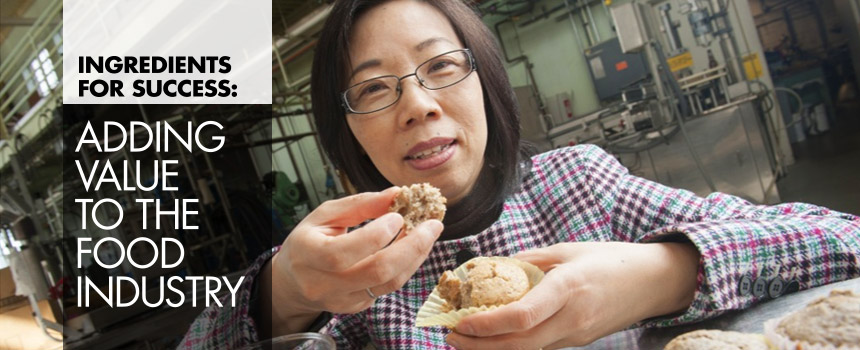Ingredients for Success

Yanyun Zhao is a master of developing unusual food combinations. Her research explores ways to extend freshness and boost nutrition using the most surprising of ingredients. For example, Zhao, a food scientist at Oregon State University, is turning leftover pulp from crushed wine grapes into a natural food preservative, a nutritional additive, and even biodegradable packaging.
The U.S. wine industry crushes more than four million tons of grapes each year, extracting the juice and creating tons of leftover stems, skins, and seeds. A small amount of this so-called pomace is used in low-value products such as animal feed, but most is hauled away at the wineries’ expense. These leftovers are packed with valuable nutrition that was literally being thrown away.
Zhao’s team has extracted dietary fiber from grape pomace and turned it into a nutritional powder that can be added to foods. She worked with OSU cereal chemist Andrew Ross to test pomace powder in muffins and breads, where it adds a gluten-free boost of fiber and nutrients. They found that pomace flour can replace as much as 20 percent of regular flour without altering taste or texture.
Because the antioxidants in pomace also control microbial growth, Zhao’s team has added the powdery fiber to yogurts and salad dressings to extend shelf life by up to a week. And if that’s not enough, she is collaborating with Western Pulp Products in Corvallis to mold pomace into biodegradable containers that will degrade quickly in soil, adding their value to the next round of compost.
Zhao finds treasure everywhere. She has extracted substances from blueberry leaves to create an edible coating that adds nutrition and shelf life to fresh blueberries themselves. Blueberry leaves, it turns out, contain high levels of antimicrobials that protect against pathogens, such as E. coli and Salmonella. To create the coatings, Zhao and an international team of scientists mixed these leaf extracts with chitosan, a natural preservative that comes from crustacean shells. Berries dipped in this clear, flavorless, organic coating stay fresh and juicy up to 25 percent longer.
“We continue to find ways to add value,” Zhao said. “One industry’s trash can become another industry’s treasure.”
